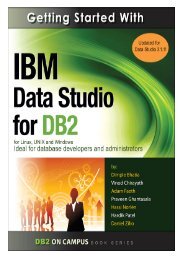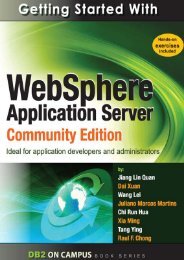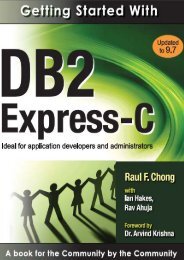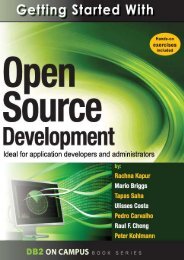Getting Started with Open Source Development
Create successful ePaper yourself
Turn your PDF publications into a flip-book with our unique Google optimized e-Paper software.
Chapter 6 – Starting your own open source project 79<br />
• <strong>Getting</strong> the members to promote the project. Once you get a few members for your<br />
community, encourage all of them to promote your community. This makes the<br />
awareness effort multiplied by the number of members.<br />
The first and most important thing that an OSS product and project needs is an appropriate<br />
license. When choosing the license, remember that users always prefer those ones which<br />
are well known in the industry; for example, BSD, GPL, etc. An unfamiliar license, even if it<br />
is very short, simple, and straight forward may discourage some users from choosing your<br />
software and contribute in the project. So, it is always recommended to select an<br />
unchanged version of a well known, popular open source license unless your product has<br />
special characteristics that would require specific terms and conditions. Refer to Chapter 3<br />
- Licensing, to get more detailed guidance on the choice of a license.<br />
Setting up channels of communication is next in the list. As discussed before, the easiest<br />
way to mass communicate all the details of your project is through a Web site. You also<br />
need to create separate mailing lists, IRC chat rooms, and blogs where people can discuss<br />
about specific matters of the project or product. Your active participation as well as the<br />
participation from other key community members will often encourage the newbies to get<br />
more involved into the project, because it shows that the project management and the main<br />
developers have the interest to understand your feedback, and fix problems proactively.<br />
Refer to Chapter 5 - Participating in open source development, for more information about<br />
this topic.<br />
Other requirements of the project include various software development tools for version<br />
control, issue tracking, automating build process, designing, coding and testing. We have<br />
discussed about these tools in Chapter 4 - Community driven development.<br />
6.3 Accepting contributions<br />
Chapter 5 gave you an idea on how you can contribute to an open source project. This<br />
section tells you, how to drive the car on your own. Growth of an OSS project strongly<br />
relies on code or some other contributions from the outer world. And as you have already<br />
learned, the only way to gather such contributions in large scale is to make your software<br />
popular among the users, so that they feel enthusiastic about participating effectively in<br />
your project. It is not very easy to make a product widely visible in the present competitive<br />
market. However, if the key concept is innovative and if your software is distinctly ahead of<br />
other existing products, it is definitely not impossible!<br />
OSS development projects typically start <strong>with</strong> small communities. Since commitment to the<br />
project is completely voluntary, some developers may not always devote much time on<br />
your project when they are busy <strong>with</strong> other important jobs. In such situations, it becomes<br />
really challenging to take the work forward <strong>with</strong> limited amount of workforce. On the other<br />
hand, once your community becomes famous and well known, you can naturally expect to<br />
get flooded <strong>with</strong> bug reports, patches, functionality improvement request etc. on a daily<br />
basis. But keep your head on your shoulder. Never try to handle all these requests<br />
yourself. Rather, delegate it properly. Redirect the issues and other reports or requests to<br />
the relevant development team, and ask any of the people <strong>with</strong>in that group to address it.

















